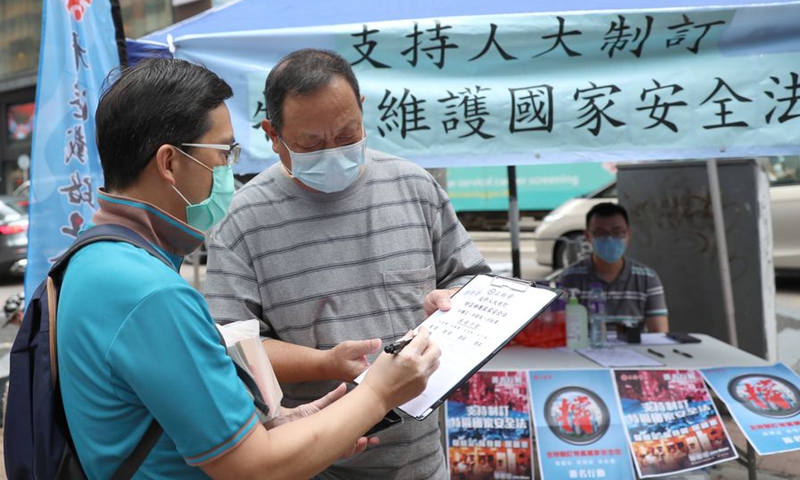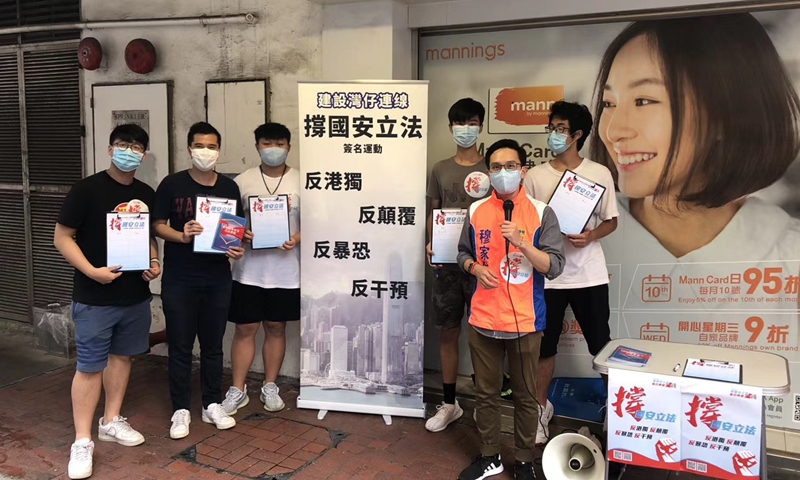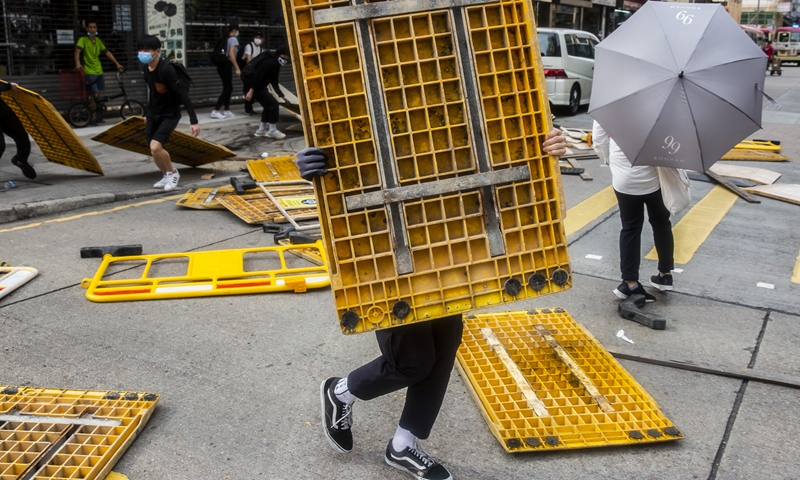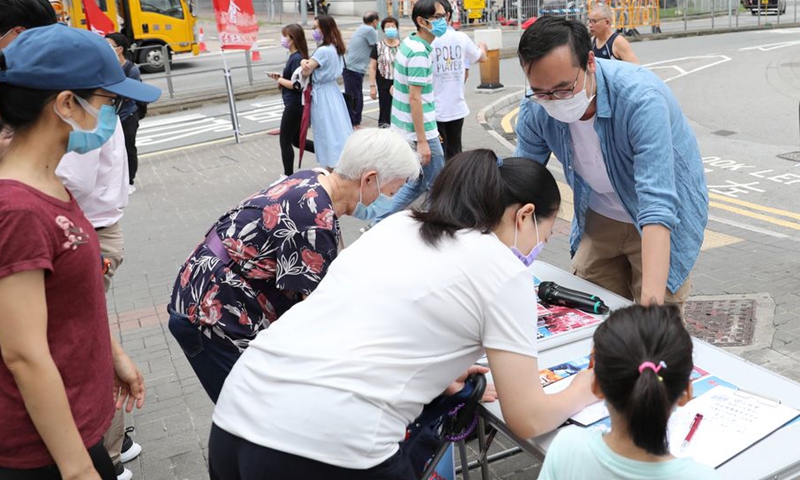National security law enactment to start
Double-level mechanism expected as both national security law and Article 23 coordinate to safeguard security in Hong Kong

A resident signs in a street campaign in support of national security legislation for Hong Kong Special Administrative Region (HKSAR) in Hong Kong, south China, May 23, 2020. (Xinhua/Wu Xiaochu)
Despite how hard some Western media outlets depict swarms of illegal protesters in Hong Kong as "heroically" anti-government, protesters' attempt to illegally besiege the Legislative Council (LegCo) and instigate more to join their radical movement failed on Wednesday. After months-long riots, illegal protesters have already lost the moral high ground as majority of the Hong Kong society oppose endless chaos that have disrupted their normal lives, and anticipate the upcoming new national security law, which will bring local radicals to justice.
After illegal gatherings in places such as Causeway Bay and Wan Chai on Sunday, with a smaller scale compared to 2019, groups of rioters, who had been planning to besiege the LegCo building to stop the second reading of the national anthem bill on Wednesday, ended up fleeing, given the deterrent effect of the upcoming national security law, which is expected to be passed on Thursday at the closing session of the 13th National People's Congress (NPC).
Chinese lawmakers are expected to pass on Thursday the draft decision on establishing and improving the legal system and law enforcement mechanisms for Hong Kong Special Administrative Region (SAR) to safeguard national security, as some observers forecast.
Though some rioters made online calls for massive gatherings on Wednesday to oppose the national anthem bill and new national security law, they failed to interrupt LegCo meetings, as they were quickly intercepted by the police, while most protesters stayed at home. Such an anti-government movement has already lost its momentum, some local officials in Hong Kong said, noting that the majority of Hongkongers are tired of endless chaos and rampage, hoping to see the national security law soon be enforced to deal with the rise in local terrorism and subversion activities.
"The majority understands they have the responsibility to safeguard national security," Regina Ip Lau Suk-yee, former security secretary and LegCo education panel chairperson, told the Global Times on Wednesday. "This is a law targeting a small number of rioters who pose a threat to national security, engage in splitting the country, subvert state power, or organize and carry out terrorist activities."

A group of Hong Kong residents show their support on Tuesday in Wan Chai for the upcoming national security law, which was announced by the 13th National People's Congress on Thursday in Beijing, aimed at ending months-long riots across the city. Photo: Courtesy of Nicholas Muk
'The sooner, the better'
Anti-government forces and radical protesters in Hong Kong who make their "deathbed struggle" to oppose the new national security law won't stop China from passing the law and accelerate its implementation. Some legal experts on Hong Kong affairs said the process of formulating would be faster than expected given the urgency and necessity, with some previously suggesting that the law would be enacted within six months, or sooner.
Tian Feilong, a Hong Kong affairs expert and associate professor at Beihang University in Beijing, said the law would be put into effect "in the near future" to remedy a legal loophole in Hong Kong national security and manifest the new law's ability to protect national sovereign security and development interests.
"The enforcement mechanism should cover four parts: investigation, prosecution, trial and serve prison sentences," Tian told the Global Times on Wednesday, noting that it would also be a rational and scientific enforcement mechanism to ensure the deterrence and implementation of the upcoming law.
The new Hong Kong national security legislation entitles the central government's national security organs to establish agencies in the SAR to safeguard national security, while the chief executive of the Hong Kong SAR government will report to the central government at regular intervals. The reports will include performance of duties in maintaining national security, conducting national security promotion education, and prohibiting acts that endanger national security according to law, details of the draft show.
Domestic terrorism is on the rise while the Hong Kong Police Force (HKPF) lacks the capability to collect relevant intelligence, which has become an outstanding issue amid social unrest, the former Hong Kong security secretary said. "Central government agencies could coordinate with Hong Kong police officers in intelligence work and information sharing under the new law," Ip said, noting that the police force now faces insufficient recruitment as many face malicious online doxxing by rioters.

Anti-government protesters block roads with construction materials in the Mongkok district of Hong Kong on Wednesday, as the city's legislature debates a law that bans insulting China's national anthem. Photo: AFP
In months-long anti-government protests in 2019, rioters attacked government buildings, including the Hong Kong SAR government, LegCo and HKPF. Police even seized homemade bombs and warned that social unrest has been sliding into terrorism, some fueled by foreign interference.As early as 7:30 am on Wednesday, the police began condemning rioters who disrupted public transport and arrested some of them in Sham Shui Po and Kwai Chung for possessing offensive weapons such as Molotov cocktails, and some set fire in Kwai Chung. With resolute law enforcement, situation was soon placed under control, and over 600 were arrested as of press time.
"It will be common that law enforcement staff sent by the central government and those from local institutes pursue suspects in national security cases together, wearing the same uniform on Hong Kong streets," Tian said.
Some Hong Kong officials and observers said even if the national security law is enacted, the SAR government would push forward Article 23 legislation.
Given the legislation would be a national law, it can be written into the regulations that establish a central-level national security mechanism, noted Li Xiaobing, an expert on Hong Kong, Macao and Taiwan at Nankai University in Tianjin. In the future, if Hong Kong enacts Article 23 of the Basic Law on its own, it will hopefully form a "double-level" system to safeguard national security in Hong Kong, he said, adding that there would surely be coordination between central-level and SAR-level mechanisms.

Citizens write down their signatures in a street campaign in support of the national security legislation in Hong Kong, south China, May 22, 2020. (Xinhua/Wu Xiaochu)
Country's resolve
Shortly after China's top legislature unveiled the draft decision on the national security law, strong opposition emerged not only in Hong Kong society but also overseas trying to obstruct the process. On Wednesday, China fired back at US threats over the new law, while mainland and Hong Kong officials claimed that the Washington won't be able to deter the country's resolve to accelerate this law.
However, some pan-democracy lawmakers and activists in the city appeared to insist on their political delusion of challenging the legitimacy of the national security law, disrupting the LegCo meetings and turning them into a new battleground for the upcoming September election. Some legal associations also questioned the central government's authority to enact the law, while some Western politicians slammed the draft decision, claiming that it was the end to "one country, two systems."
"In drafting the law, the top legislature is expected to hear a wide range of opinions. In terms of questions raised on the legal aspect, authorities in Hong Kong are also open to discuss and further deliberate on the legislation," Han Dayuan, a member of the Hong Kong Basic Law Committee of the Standing Committee of the NPC, told the Global Times on Wednesday.
"However, if the debate is for political purposes by defying its constitutionality and legitimacy, there won't be any professional judgment to make," he said.